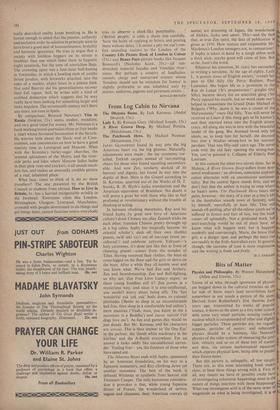From Log Cabin to Nirvana
The Patchwork Hero. By Michael Noonan. (Heinemann, 15s.).
JAPAN GLOSSIF1ED found its way into the big American heart via the big glossies. Naturally, adjustments were made : the tea ceremony cur- tailed, Turkish carpets instead of rice-matting, chairs for those who found squatting uncomfort- able. And now Zen, similarly docked of its humour and dignity, has found its way into the depths of Beat. Here is the Gospel according to St. Kerouac, quarried out of the Works of D. T. Suzuki, R. H. Blyth's haiku translations and the American equivalent of Bradshaw. No doubt it will prove a great hit with those who like to feel profound or revolutionary without the trouble of thinking or acting.
In between climbing mountains, Ray and his friend Japhy ('a great new hero of American culture') drink Chinese tea, play Zennish tricks on each other, translate Chinese poetry (brought up in a log cabin, Japhy has magically become 'an oriental scholar'), dash off their own (feeble) poems, swill saki (sic) out of tea-cups (most un- cultured!) and celebrate yabyum. Yabyum—`a holy ceremony, it's done just like this in front of chanting priests'—comes from the temples of Tibet. Having removed their clothes, the boys sit cross-legged on the floor and the girls sit down on the boys. After a while they all tumble over and you know what. We've had Zen and Archery, Zen and Swordsmanship, Zen and Bull-fighting, so Why not 'Zen Free Love Lunacy orgies,' as these young buddhas call it? Zen moves in a mysterious way; and since it is anti-intellectual, you needn't worry about being silly. The 'fast wonderful yak yak yak' boils down to colossal platitudes ('Better to sleep in an uncomfortable bed free, than sleep in a comfortable bed unfree'), mere inanities (`Yeah, man, you know to me a mountain is a Buddha') and fausse naiveté Call dogs love me'). As fun and games this would be just dandy. But Mr. Kerouac and his characters are serious. This is their answer to 'the One Eye' in the parlour, the 'dumb white machinery in the kitchen' and the A-Bomb everywhere. For an answer it looks oddly like unconditional surren- der. 'Feeling free': yes, the freedom of those who have opted out.
The Dhartna Bums ends with Japhy, sponsored by an American foundation, on his way to a Japanese monastery, and Ray climbing down yet another mountain. The best of the book is debased Whitman or synthetic Tom Sawyer and Fenimore Cooper. The only humorous considera- tion it provokes is that, while young Japanese dream of France, the wonderland of sartres, sagans and chansons, their American coevals (it seems) are dreaming of Japan, the wonderland of bhikku, haiku and safari. This—and the fact
that, in true Zen spirit, the date of publication is
given as 1950. How mature and responsible Mr. Maclnnes's London teenagers are, in comparison!
If Japhy is taken in hand by a tough abbot with a thick stick, maybe good will come of him. But so far, bum's the word.
Whatever his intention, M. Gary has succeeded
in writing a novelette. At the age of eighty, Lady L, 'a grande dame of English society,' reveals her past to Old Silly (Sir Percy Rodiner, Poet Laureate). She began life as a prostitute in the Rue de Lappe (Ws preposterous!' gurgles Old Silly), became decoy for an anarchist gang ('Sir Percy opened his mouth, but no word came out'), helped to assassinate the Grand Duke Michael of Bulgaria ('Why, damn it, he was a cousin of the Marymounts!' roars Old Silly, 'You will never be received at Court if this thing gets to be known'), and then married twice into the English aristo- cracy. All along she was in love with the beautiful leader of the gang. But Armand loved only his ideals, so, to keep him for herself, she decoyed him into a Madras strong-box in her summer pavilion. That was fifty-odd years ago. The novel ends with the old lady opening the strong-box. Yes, you've guessed it. Collapse of Elderly Poet Laureate.
In this context the other two novels shine. Set in Malaya, A River Grown Deep suffers from first- novel weaknesses :-an obvious, conscious sophisti- cation alternates with an unconscious sentimen- tality. But the central figure stands firm, and we don't feel that the author is trying to reap where he hasn't sown. The Patchwork Hero bears the palm, however : the story of a year in a boy's life in the Australian seaside town of Serenity, told by himself, mercifully in later life: This still sounds off-putting, after all the odious youth we've suffered in fiction and fact of late, but the book comes off splendidly. Not a profound work, but soul-searching would be out of place here; we know what will happen next, but it happens modestly and convincingly. Marie, the brave frail girl, is a danger spot, and perhaps the tears rise too readily in the Irish-Australian eyes. In general, though, the sureness of tone is most impressive, and the writing.is fresh and lively. he
D. J. ENRIGHT










































 Previous page
Previous page